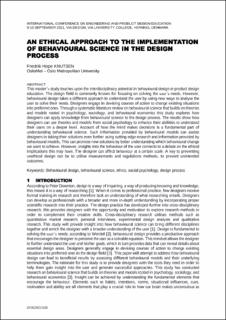| dc.contributor.author | Knutsen, Fredrik Hope | |
| dc.date.accessioned | 2022-02-17T14:15:05Z | |
| dc.date.available | 2022-02-17T14:15:05Z | |
| dc.date.created | 2022-01-04T18:37:50Z | |
| dc.date.issued | 2021 | |
| dc.identifier.isbn | 978-1-912254-14-9 | |
| dc.identifier.uri | https://hdl.handle.net/11250/2979776 | |
| dc.description.abstract | The product design field is commonly known for focusing on solving the users' needs. However, behavioural design can contribute with a different approach in design education, where the aim is to adapt and understand the user in a new way first, in order to solve their needs. In the design field, it is well accepted that designers engage in devising courses of action to change existing situations into preferred ones. This study has sourced literature on behavioural science with theories and models rooted in psychology, sociology, and behavioural economics fields. The information provided by behavioural models can assists designers in taking their solutions further with cutting edge research and information provided by behavioural models. This can promote better solutions knowing which behavioural change to achieve. This study will provide tools and insight on how the mind makes decisions, which will go into depth on how fundamental part of designing for behavioural change can have. However, the behaviour of the individual sparks a debate on the ethical implications this may have. The designer can successfully affect behaviour at a respectable scale. A key to preventing unethical design is to utilise measurements and regulations in design education, such as Berdichevsky and Neuenschwander (1999) map 'Responsibility of intended and unintended outcome' or Jen Gispen toolkit called ‘ethics for designers». Implications for practice from this study demonstrate how product designers can apply knowledge from behavioural science in an ethical way into the design process. Keywords: Behavioral design, behavioral science, ethics, social psychology, design process | en_US |
| dc.language.iso | eng | en_US |
| dc.publisher | The Design Society | en_US |
| dc.relation.ispartof | DS 110: Proceedings of the 23rd International Conference on Engineering and Product Design Education (E&PDE 2021), VIA Design, VIA University in Herning, Denmark. 9th -10th September 2021 | |
| dc.relation.ispartofseries | E&PDE;DS 110: Proceedings of the 23rd International Conference on Engineering and Product Design Education (E&PDE 2021), VIA Design, VIA University in Herning, Denmark. 9th -10th September | |
| dc.rights | Navngivelse-Ikkekommersiell 4.0 Internasjonal | * |
| dc.rights.uri | http://creativecommons.org/licenses/by-nc/4.0/deed.no | * |
| dc.subject | Behavioural design | en_US |
| dc.subject | Behavioural science | en_US |
| dc.subject | Ethics | en_US |
| dc.subject | Social psychology | en_US |
| dc.subject | Design processes | en_US |
| dc.title | An Ethical Approach to The Implementation of Behavioural Science in The Design Process | en_US |
| dc.type | Conference object | en_US |
| dc.description.version | publishedVersion | en_US |
| cristin.ispublished | true | |
| cristin.fulltext | original | |
| cristin.qualitycode | 1 | |
| dc.identifier.doi | https://doi.org/10.35199/EPDE.2021.37 | |
| dc.identifier.cristin | 1974721 | |
| dc.source.volume | 110 | en_US |
| dc.source.issue | 110 | en_US |
| dc.source.pagenumber | 6 | en_US |

